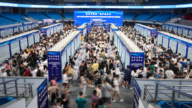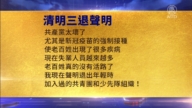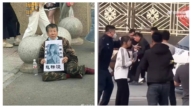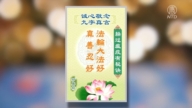【新唐人2014年07月02日讯】日前,香港首富李嘉诚在广东“汕头大学”出席毕业典礼时披露,近来有三件事一直困扰他,忧心使他“无心睡眠”。那么到底是哪三件事情使这位85高龄的富翁烦忧、彻夜难眠?与他最近从大陆和香港频频抛售物产和撤资有什么联系?一起来看报导。
香港“长实集团”主席李嘉诚,6月27号上午出席了由他创立的“汕头大学”毕业生毕业典礼,身兼校董会名誉主席的李嘉诚以“无心睡眠”为题发表致词。
在致词中他表示,85岁的他,对世间各种个人得失,早被风风雨雨冲淡,还有何忧心?
香港长实集团主席李嘉诚:“我忧心的是,在全球化和知识经济的时代,不同的智商、能力和努力,令机会失衡成为新常态。我忧心,国家资源的局限成未来发展的难题。”
李嘉诚还忧心,高福利社会人民的负担和对贫富悬殊的愤怒,持续让社会停滞和不安。
李嘉诚旗下的私人创投基金“维港投资”,6月23号起在中国六个城市进行巡回推介,负责人周凯旋在推介会致辞中也曾介绍,李嘉诚担心全球贫富悬殊持续,尤其在中国可能会恶化﹔还忧虑中国缺乏耕地及安全的饮用水﹔此外,他也担心人与人之间欠缺互信,彼此没有讲真话。这三件事让李嘉诚“睡不着”。
北京原首都师范大学教育科学学院副教授李元华:“他睡不着觉,一个是对于中国这个现实社会很多贫苦的人,看到了(他们)很痛苦,还有教育变成了一种产业,甚至是一种捞钱的工具。他可能从一个侧面看到了问题的实质,就是今天中国这个社会共产邪党统治几十年来,把中国传统道德破坏了,人与人之间没有一个基本的信任。”
中国历史学家、原“首都师范大学教育科学学院”副教授李元华表示,作为炎黄子孙的李嘉诚,他希望他能改善中国国民的生活,投入的教育能培养出真正造福社会的人才,但实际的情况使他很失望,又不能直说。
李元华:“因为他这么些年来在中国社会,跟各级中国官员打交道,他知道这个中国整个这个社会是很腐败的现状,而且也看到了中共很多经济上面临的崩盘,包括他投入的房地产和许多的企业,他已经看到了危险性。”
连续16年雄踞华人首富宝座的李嘉诚,自去年8月以来,以低于市价35%以上的价格,抛售了广州的“西城都荟”购物广场、和上海的“东方汇经中心”、南京的“国际金融中心”大厦。李嘉诚儿子李泽楷今年也出售了北京“盈科中心”商场。李氏家族似乎在大陆不再拥有大规模的地产项目。
根据联合国计划开发署的统计资料显示:目前中国占人口总数20%的最贫困人口,占收入或消费的份额只有4.7%,而占总人口20%的最富裕人口,占收入或消费的份额则高达50%。这表示,中国现在已是世界上收入差距最大的国家。
北京《国情内参》首席研究员巩胜利:“如果按照联合国人均每天1美元来计算,中国大概超过3亿穷人,如果按照更严谨的贫富数据来统计,中国真正的贫困线,大概接近4亿人口。”
北京《国情内参》期刊首席研究员巩胜利认为,中共从产业到金融,和社会的垄断,制造了贫富悬殊的生态困局。
巩胜利:“政府不讲信誉,政府的金融货币不讲信誉,结果政府的国有企业不履行合同。中国整体的信誉、道德、社会、人文都出现了大倒退,倒退的结果,人没有信誉。”
李元华表示,李嘉诚的担忧及撤资,实际上是对整个中共统治的一个不信任或一个担忧。
采访编辑/易如 后制/舒灿
The Three Worries Of China’s Richest Tycoon Li Ka-shing
At the commencement ceremony of Shantou University
in China’s Guangdong Province, Hong Kong billionaire
Li Ka-shing said there are three things that have bothered him
to the extent that he cannot sleep well at night.
What are the three things that made this 85-year-old magnate
so worried and sleepless at night?
Is it related to his recent property sell-off in mainland China
and Hong Kong? Let’s see the following reports.
On the morning of June 27, Chairman of Hong Kong’s
Cheung Kong Holdings (CKH) Li Ka-shing, attended
the commencement ceremony of Shantou University,
which he founded.
As honorary chairman of the university council,
Li Ka-shing gave a speech entitled, “Sleepless Night."
In his speech, he said that at 85-years-old, he has long taken
various personal losses and gains lightly.
What else is there for him to be concerned about?
Li Ka-shing, “What I’m worried about is that in the era
of the globalization and knowledge economy, differing
intelligence, capability and effort have turned the imbalance
of opportunities into a new norm.
I’m worried that limitations of national resources
may become a problem for future development.”
Li Ka-shing worries that the high social welfare burden
as well as anger and unrest due to disparity may prolong
social stagnation.
Since June 23, Li Ka-shing’s venture capital firm, Horizons
Ventures, has been on a promotional tour in China’s six cities.
In her remarks at a promotional seminar, Solina Chau,
head of the promotion campaign, also mentioned that
Li Ka-shing is worried about the continued disparity
of global wealth, especially in China.
He is worried about China’s lack of arable land
and safe drinking water.
In addition, he is also worried about the lack of mutual trust
among people, that is people do not tell the truth to each other.
These are the three things that have made it difficult
for him to fall asleep.
Former Associate Professor of Beijing Capital Normal
University Li Yuanhua: “He can’t sleep because he noticed
the many impoverished people in Chinese society,
and he sees them in a lot of pain.
Education has became an industry, a tool for making money.
He sees the essence of the problem from another aspect,
and that is under the Chinese Communist Party’s rule over
the past decades, the Chinese traditional morality has been
damaged and there is no basic trust among people.”
Li Yuanhua expressed that as a Chinese, Li Ka-shing
hopes he can improve Chinese people’s living,
and that education will really cultivate some talents
who will enhance the well-being of society.
In fact, he is disappointed by the realities,
but he cannot express it outright.
Li Yuanhua: “Because he has dealt with Chinese government
officials at various levels in Chinese society, he knows that
Chinese society is currently very corrupt.
He has also noticed that China’s economy is on the brink
of collapse.
In particular, he has foreseen the risks in real estate
and other various businesses he invested in.”
As the richest Chinese business tycoon for 16 consecutive
years, Li Ka-shing has sold his shopping plaza
in the Guangzhou Metropolitan Plaza, the Credit Agricole
in Shanghai and the International Financial Center in Nanjing.
They were priced 35 percent lower than
last August’s market price.
His son Richard Li also sold his Beijing shopping mall,
Pacific Century.
It seems that the Li family has no longer owns
large-scale real estate projects in China.
According to United Nations Development Program statistics,
currently China’s poorest people account for 20 percent
of its population, but their income and consumption
only account for 4.7 percent of the national data.
But the richest 20 percent of the population dominate
as much as 50 percent of the income or consumption in China.
These figures show that China is now the country
with the largest income disparity in the world.
Gong Shengli, chief researcher at Beijing’s Internal Reference
Magazine: “According to the UN’s standard of $1 per person
per day, there are over 300 million poor people in China.
If more stringent data is used for the real poverty line,
China will have close to 400 million people in poverty.
Gong Shengli feels that CCP’s monopoly of industries,
finance, and even society, had created the wealth disparity.
Gong Shengli: “Neither the government nor its financial
currency has credit.
As a result the government-owned enterprises
do not fulfill their contracts.
China’s overall credibility, morality, culture, and society
have suffered a huge retrogression.
The result of the retrogression is that people
have lost credibility."
Li Yuanhua indicates that Li Ka-shing’s concerns
and divestment are in fact a distrust or worry
about the entire Chinese Communist Party’s rule.
Interview & Edit/YiRu Post-Production/ShuChan


























